Chinese people fall in love with coffee foreign coffee chains are growing rapidly in China
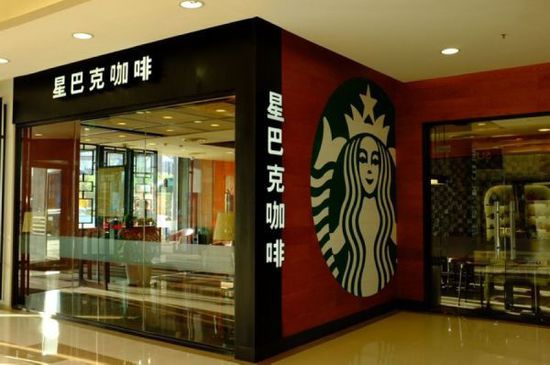
The picture of a Starbucks store in China comes from the Internet.
The reference News Network reported on December 30
Foreign media said that from Best Buy to B & Q, many foreign brands and business models have encountered Waterloo in China. However, the western retail concept, foreign coffee shops, which was perhaps the least likely to succeed, has flourished in China.
Although China has a history of drinking tea for thousands of years, coffee chains from the United States, Britain and South Korea have been able to expand rapidly in China, according to the Financial Times website on December 29. Sales in these coffee shops are growing faster than almost all retail businesses in mainland China. Sales of coffee chains more than doubled last year from less than 10 billion yuan in 2008 and are expected to double again by 2017, according to data from Euromonitor.
Several retail analysts say Starbucks, an American coffee chain, has essentially built a contemporary coffee culture in China from scratch. By contrast, they point out, tea is not only the most popular drink in China, but also deeply rooted in Chinese culture.
Since opening its first store in mainland China in 1999, Starbucks has positioned its store as a fashionable place to meet friends and get close to the Western lifestyle. Through this positioning, Starbucks has become one of the most famous lifestyle brands in mainland China. Starbucks' huge popularity has even changed the taste buds of Chinese people, and China's consumption of freshly brewed coffee is also increasing.
As the market continues to expand, it also continues to diversify. In the past few years, niche Korean cafes have sprung up like bamboo shoots after a spring rain, and independent coffee shops can be seen everywhere in big cities. In addition, from McDonald's and KFC to convenience store brands in Japan and Taiwan, all stores have begun to promote freshly brewed coffee.
Last year, China's state broadcaster CCTV lashed out at Starbucks' overpricing on the mainland. However, Starbucks not only shrugged off the impact of that attack, but also accelerated its expansion. Earlier this month, Starbucks said it planned to double the number of its stores to more than 3000 by 2019.
The company also plans to double its stores in China to 700 by 2018, according to Esteban Liang, managing director of Kashijia Coffee Asia. Kashijia Coffee is a coffee chain controlled by Whitbread. In addition, Man Coffee also said it intends to expand the number of its stores in mainland China from the current 100 to 200 by the end of 2015. Man Coffee is a popular restaurant chain, which started in South Korea and has the characteristics of both cafe and leisure.
Esther Lau, retail analyst at Mintel, said: "it can be foreseen that South Korea, the United States, the United Kingdom, as well as local coffee chains and fashion independent cafes." It will lead to a great degree of diversification in the market, which will consolidate the large-scale growth of the market. "
Shangdao Coffee is one of the first Taiwanese coffee chains to enter mainland China. The company's Frank Yin says that the more coffee shops there are now, the more coffee shops are likely to open in the future. "the more coffee shops appear, the more people are familiar with coffee," he said. "
However, in terms of market share, while Starbucks is growing rapidly, Shangdao Coffee is one of the biggest losers. From 2008 to 2013, Starbucks' market share in China increased from 12% to 31%, while Shangdao Coffee's share fell from 33% to 22%, according to Euromonitor.
At the same time, McDonald's, which had little share, also opened 800 in-store McCafe restaurants, expanding its market share to 6 per cent. During the same period, Kashijia's share increased from 1% to 5.5%. Until recently, most of Yum's KFC outlets in mainland China did not serve coffee. Recently, however, the company has also begun to promote coffee. Today, the company also sells freshly brewed coffee in convenience stores in many first-tier cities.
Tang Shide, Kearney's retail partner in Greater China, said: "of course, competition is also intensifying. However, in my opinion, even the density of coffee shops in Shanghai cannot be compared with that of Japan and South Korea. "
On a recent cold weekday afternoon, the 374 seats in a coffee shop on the outskirts of Shanghai were filled with people, mainly friends who were chatting loudly in groups. At the same time, the Starbucks in a nearby office building is almost full, with customers dominated by individuals who work on laptops or talk to colleagues.
What is even more surprising is that more and more mainlanders are not just patronizing coffee shops, they are also buying coffee drinks instead of non-coffee drinks that used to be more popular.
Speaking of sweet cream instant coffee, which is popular among emerging coffee drinkers in mainland China, Mr Tang said: "even compared with five years ago, people's ability to appreciate the flavor of coffee is greatly improved. Five years ago, for most people, coffee was Nestl é three in one. "
Mintel's Esther Lau said that given that the average consumption of coffee per person in mainland China is only four cups a year, there is still a lot of room for coffee sales to grow.
Extended Reading Cat Bookstore appears in Nanjing to taste coffee, read books and see "Cats"
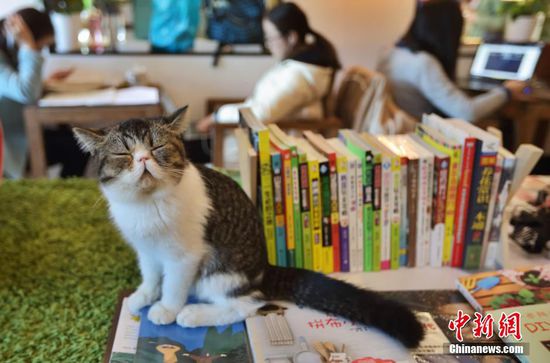
On December 17, a "Cat Coffee Bookstore" with cats and books as its theme elements settled in Tongxi Ruidu, Jiangning, Nanjing, with 20 naive Garfield, slender Thai Siamese cats, and cute American short-haired cats. Some of them are jumping between tables, some are leaning against books, and some are sleeping lazily with their eyes closed, attracting many young people to come and read and relax with cats. China News Service, Photo by Shaobo
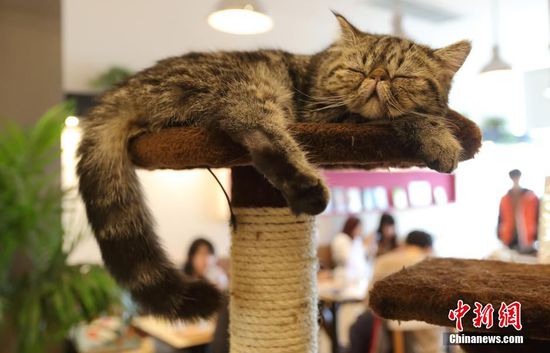
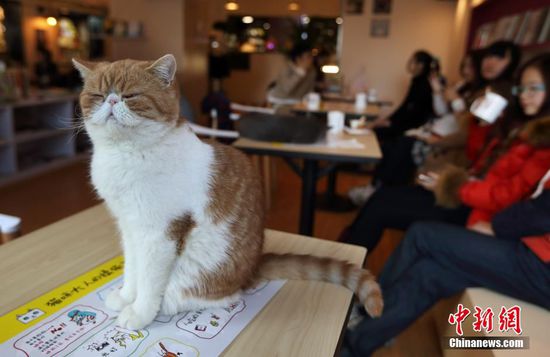
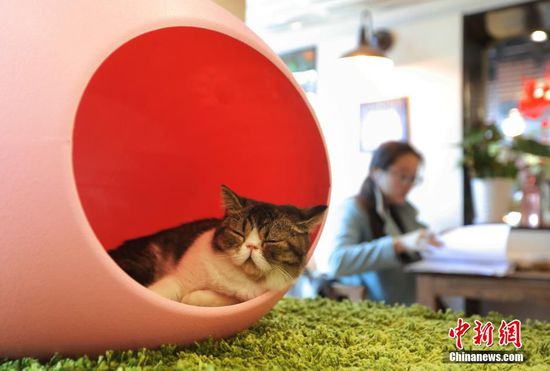
Coffee consumption in China is growing by more than 20% a year, exceeding the global average growth rate by 10 times.
Chinanews.com, Guangzhou, Dec. 11 / PRNewswire-Asianet / (Wang Hua Yiwu) the only coffee professional exhibition in South China-2014 Guangzhou Coffee Expo opened on the 11th. The reporter learned from the exhibition that with the rapid development of China's coffee market, the annual coffee consumption growth rate is more than 20%, which is more than 10 times the world average consumption growth rate.
The consul general of Uganda, Ethiopia, Turkey and other countries attended today's opening ceremony. The exhibition covers an area of nearly 10000 square meters. High-quality coffee from more than a dozen countries around the world has filled the room with fragrance, and Pu'er coffee has also been reinstalled to promote Chinese coffee brands. Exhibitors also include all kinds of coffee drinks, processing equipment, coffee machines, bean grinders, coffee utensils and so on.
Data from the organizing committee and industry insiders show that with the rapid development of China's coffee market, the annual coffee consumption growth rate has reached an astonishing 20%, while the annual growth rate of world coffee consumption is only 2%. Some experts estimate that there are more than 200 million potential coffee consumers in China.
It is understood that the coffee bean manufacturers in the Pearl River Delta region account for more than half of the country. In Guangzhou alone, there are more than 1000 coffee consumption places such as coffee shops, western restaurants and bars, and nearly 200 coffee trading companies. China will become the most potential coffee consumer in the world, while the Pearl River Delta region with Guangzhou as the center is expected to become China's largest consumer and trade market.
During this coffee exhibition, the third Pu'er Coffee Cup World siphon Pot Competition and the 2014 "Tops Cup" Coffee Baking Masters Competition will be held, with prizes up to 120000 yuan, attracting many elite baristas to participate in the competition.
In addition, there are a number of coffee culture activities during the exhibition. Ms. Chen Ruoyu, honorary director of the Taipei Fine Coffee Business Development Association, will come to the scene to give a lecture. Jinfeng, Japanese coffee worker and founder of Hyland Cafe, and Chiba, vice president of KONO, will demonstrate the production of hand dripping and siphon pot coffee at the Hailan Cafe booth, bringing pure Japanese coffee culture experience.
Important Notice :
前街咖啡 FrontStreet Coffee has moved to new addredd:
FrontStreet Coffee Address: 315,Donghua East Road,GuangZhou
Tel:020 38364473
- Prev

Boutique Coffee Market Coffee Shop to be listed in "Black Tea country" India
CafeCoffee Day, India's largest coffee chain, will go public this year with a market capitalization of about $1 billion. CafeCoffee Day is a successful Indian coffee chain with 1650 stores in India, more than three times the number of stores owned by its competitors. The launch of CCD reflects that coffee has gradually gained a place in India, a big tea country. Black tea is popular.
- Next
Romantic coffee trip a group of coffee friends adopt coffee trees in Aini Pu 'er coffee garden
Recently, dozens of coffee lovers from all over the country came to China's main coffee producing area, Pu 'er City, Yunnan Province, to hold an adoption ceremony for coffee trees in Manzhongtian Subtropical Rainforest Coffee Garden. They hung adoption cards with their own names and messages on the coffee trees they claimed, and vowed to become volunteers to spread Chinese coffee culture
Related
- What brand of black coffee is the most authentic and delicious? what are the characteristics of the flavor of the authentic Rose Summer Black Coffee?
- Introduction to the principle and characteristics of the correct use of mocha pot A detailed course of mocha pot brewing coffee is described in five steps.
- Which is better, decaf or regular coffee? how is decaf made?
- How much is a bag of four cat coffee?
- How about four Cat Coffee or Nestle Coffee? why is it a cheap scam?
- Which is better, Yunnan four Cats Coffee or Nestle Coffee? How about cat coffee? is it a fake scam? why is it so cheap?
- How about Cat Coffee? what grade is a hoax? which instant coffee tastes better, four Cat Coffee, Nestle Coffee or G7 coffee?
- Process flow chart of coffee making-Starbucks coffee making process what coffee tastes good at Starbucks
- The top ten best coffee beans in the world Rose summer coffee or Tanzanian coffee tastes good
- Yunnan four cat coffee is good to drink?_four cat coffee is a big brand? four cat blue mountain coffee is fake?

